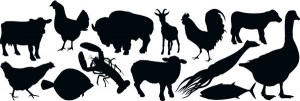The New York Times sponsored a contest: “Defending your Dinner: An Open Contest for Hungry Ethicists.” I’m a sucker for contests, raffles and such, even though I never win. This effort met with predictable results.
Because I was curious about when the “winners” might have their essays printed, I poked around on the Internet. Much to my surprise, I discovered that six finalists had been chosen, and in the style of The Voice or American Idol, the public was invited to vote for the winner. The essays were posted on April 20 and voting closed at midnight April 24. Not being a person who spends much time reading anything online, I missed the deadline and lost the chance to vote. I am nothing if not consistent.
Inasmuch as I wrote an essay and spent considerable time polishing it down to fit into the 600-word limit, I’m posting it here. No reason to waste it and besides, I haven’t made a blog post is a while. So here it is.
The Ethicist explains that “those who forswear meat have made the case that what we eat is a crucial ethical decision. To be just, they say, we must put down our cheeseburgers and join their ranks.” Those of us who enjoy our cheeseburgers apparently let them get away with that sweeping indictment.
The challenge she poses is to explain “why it is ethical to eat meat.” Essayists must opine on dietary morality by defending omnivorous cuisine. The question, in fact, demands that our suppers be positioned on a moral continuum, so that we might, as fast-food caviler David Zinczenko decrees, “eat this and not that.”
We may not, however, resort to the argument that one human’s meat is another person’s nutmeat.
In philosophy, the Oxford English Dictionary says, ethics pertains “to ethos as opposed to pathos,” which is to say dealing not with the transient or emotional (pathos) but the permanent or ideal (ethos). Both factions might agree that wise dietary choices should be more a matter of moral ratiocination (ethos) than gustatory emotion (pathos). Assuming, however, that one eats for reasons that go beyond simple survival, carnivoracity is magnanimous and altruistic to the same degree that it is selfish, greedy and environmentally rapacious and vegetarianism is no different.
Both diets support agribusiness. Both contribute to the increasing genetic homogeneity of grains, fruits, and vegetables, beef, pork and poultry. Problems associated with mountains of manure are comparable to damage wreaked by tons of chemical fertilizers. Clear-cutting of forests, depletion of soil nutrients and erosion of the soil itself speaks as much to a global demand for grain as for beef. Ideologues on both sides can claim high ground staked out by locavores. Both are guilty of squandering fossil fuels in order to satisfy particular hungers, regardless of place or season.
We humans already occupy dubious moral territory in the natural world to which we ostensibly belong. The ethical devil is everywhere in the details because the ethics lie less in what one eats than how and why one eats.
Consider the following.
Our forbears largely eradicated a variety of animals from the continent, including predators like wolves and big cats who reside just below humans on the food chain. They almost wiped out white-tail deer, too, reducing their total numbers to about 500,000 by 1900. Once deer received protection, however, their population rebounded and now there are something over 20 million of them. Under “optimal conditions,” the number of deer may double every two years.
Beware, one and all, the law of unintended consequences.
My property clearly has optimal conditions. The couple of deer that occasionally strolled through our backyard in 2005 have become a herd of about a dozen.
Leaving deer to multiply unchecked would not—in any way, shape or form—be an ethical act. Deer destroy habitat needed by countless other species; they wipe out ground cover that protects against the silting of streams and lakes. They cause car accidents that kill and maim themselves and people.
Then there’s the problem of exotic animal species and the havoc they cause. Pythons are released into the wild in Florida. Nutria escaped their cages for the Louisiana marshes. Northern snakeheads thrive in Maryland waterways. Feral pigs devastate landscaping and crops in Texas, California, Michigan and New York.
Nutritional choices can and should be moral. Let our dinners improve the world we leave to our children. If you want to make the ethical choice: order up a haunch of venison, maybe fricassee of nutria or python steak. I’ll have a dandelion salad with mine.

